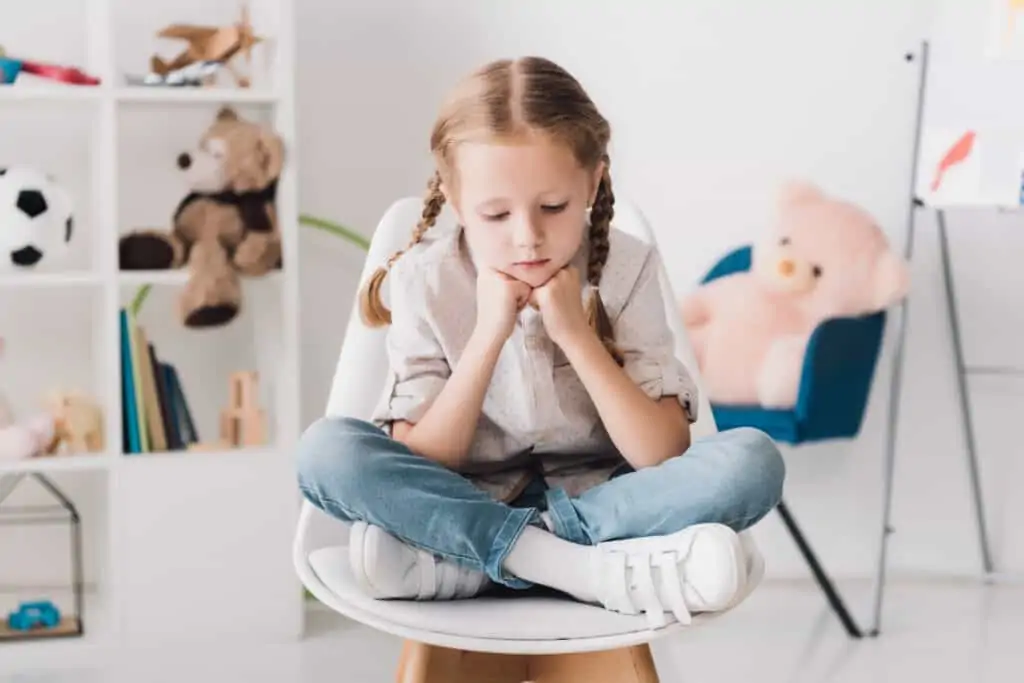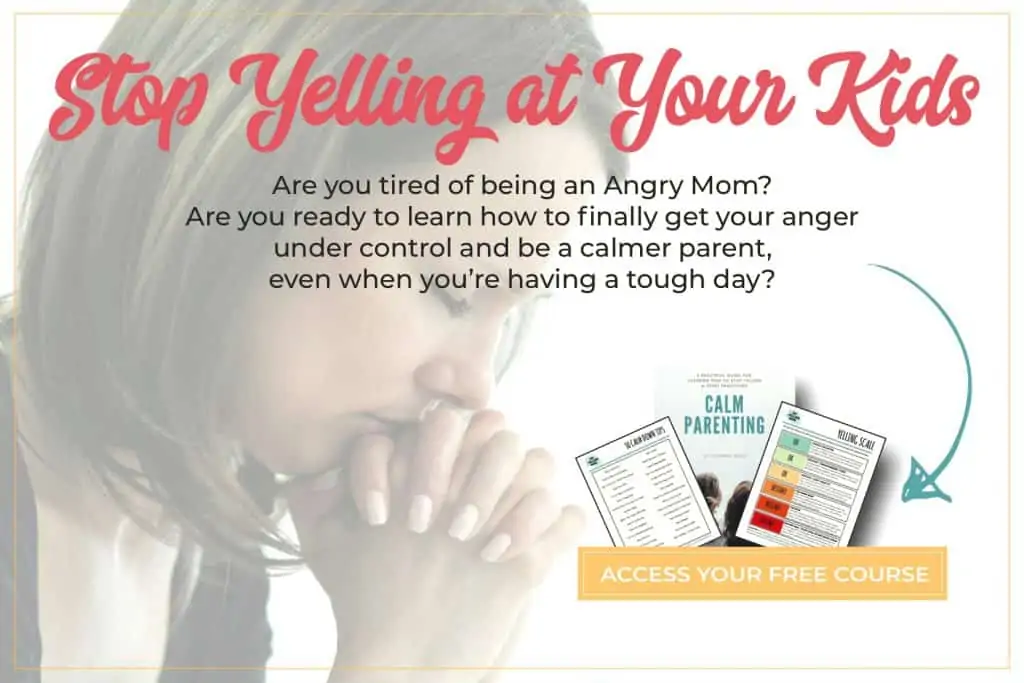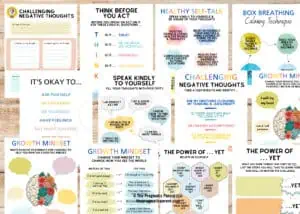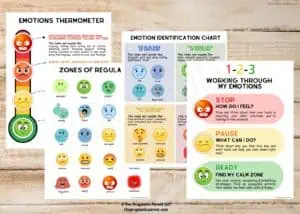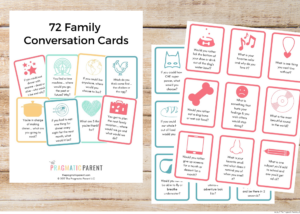Inside This Post: We all get angry from time to time. New & awesome tips to help you stop yelling when angry at your kids & how to catch yourself before you lose your temper. Ready to take the leap and BIG changes? Calm Parenting: Learning to Stop Yelling as helped hundreds of parents already. See what all the fuss is about and how this ecourse retrains the brain for calm, patient responses.
Not ready for the course? The beginner’s guide to stop yelling is the perfect place to begin.
Why Am I Getting Angry With My Child?
It’s 10 minutes before I need to be out the door and I tell the kids, “get your shoes and jackets on,” and then continue to rush around putting everything I need in my purse, swipe on some mascara and top off my coffee mug.
2 Minutes before we needed to be out the door and buckled in the car, and I look up to see all three kids tossing balloons into the air in the living room.
They are still barefoot and still don’t have jackets on.
Then, to add to my frustration, I look around and notice their cereal bowls still on the table and not in the sink like they’re supposed to be, the dog is whining to go outside… again… and while I never want the kids to be late for school… but here we are, obviously heading in that direction.
That’s when it happens.
My hands clench.
I grit my teeth.
And let it all out.
I yell.
“I said get your shoes and jacket on NOW!”
When my four-year-old whispered as she ran past me, “you’re a mean Mommy” under her breathe, I can’t stop the tears.
Partly because I know she’s right, and partly because I immediately regretted my reaction.
I never want to be a parent who loses her temper, especially when it was directed at my children.
This moment is seared into my memory and part of why I work hard to change how I parent.
No matter how much I want to stay calm and be in control of my temper, it’s not a snap your fingers and it’s fixed remedy.
In fact, it’s not an easy journey at all, but because I chose to make our home, my heart, and how I treat my children a safe place for them at all times, it’s a journey worth being challenged by and working through, each day.
I know I can’t let my feelings damage everything and everyone I love, even a little.
Recognizing Triggers Making You Angry
The first step to changing, is to recognize the triggers which make you angry, and then being aware for how your body reacts.
Your body shows signs of agitation, just like we read other’s body language to recognize when they’re sad, angry or happy.
Your body will give you clues BEFORE you even recognize you’re getting upset.
Signs You’re Getting Worked Up:
- Clenched fists
- Grinding teeth
- Biting your lip
- Fidgety
- Your pulse is quickening
Feelings Drive Your Reaction
Neuroscientist Antonio Damasio, author of Descartes’ Error: Emotion, Reason and the Human Brain, says it’s our feelings that decide for us, 95% of the time.
We feel before we think.
We feel before we act.
He describes human feelings by saying, “We are not thinking machines. We are feeling machines that think.”
Since ultimately, we make decisions based on how we feel, it’s important for parents to be aware of their feelings. To tune into the body’s reaction to triggers and alert our brains of the flashing red light that we need to press pause. Otherwise, we will lead with our feelings of anger and react in a way thats unlike the parent we want to be.
STOP LOSING YOUR TEMPER WITH YOUR KIDS
I want to share with you, a few things to do when you feel like you’re about to lose your temper. This is more than “take a few deep breaths” or “go hide in the closet and eat a bag of chocolate chip cookies.” These tips go beyond that.
These are new ideas you can try today to help you stop losing your temper with your kids.
- Give your child a 20-second hug. Push your pride aside when you begin to feel angry, and chose to love your child in the moment instead. A 20-second hug has scientifically been shown to reduce blood pressure and heart rate, helping to bring you back to a state of calm.
“A 20-second hug, along with 10 minutes of hand-holding, also reduces the harmful physical effects of stress, including its impact on your blood pressure and heart rate.4 This makes sense, since hugging is known to lower levels of stress hormones like cortisol.”
- Pretend like you’re not alone. Visualize another person like your Mom, best friend or your child’s teacher being in the same room as you. How would you react if they were standing nearby. Probably differently, right? You’ll follow all your parenting rules like responding not reacting, and staying calm, leading with empathy, and talking kindly because others are there to hold you accountable.
- Get down to your child’s level so you’re looking at each other eye-to-eye. When you look into the eyes of your little love, can you imagine raising your voice looking at them in the eye? No, because the thought of yelling at them immediately disappears when you see their eyes staring back at you.
- If your kids are acting out, or not listening, repeat the phrase, “He is just a kid. He’s only (use your child’s age) years old.” This will remind you that they’re only being kids and because they don’t have all the tools like adults do to calm their body, or remember more than one task at a time, it helps you calm down and remember their real age and capabilities.
- Lead with the positive. Start with, “I love you” or “One of the things I love most about you is…” and then address the problem. You can say, “I love you, but I don’t like the choices you’re making right now” or ” One of the things I love most about you is how kind you are, but right now, you aren’t being kind when you say hurtful things to your sister.”
- Change your voice to change the environment. Instead of yelling, whisper what you want your kids to hear or do. You’ll notice that all the noise in the room will quickly stop so your kids can hear what you’re saying. Plus, the calmer you speak to your kids, the more they want to listen and the greater impact your words will have.
- Recognize your triggers. Is it noise, running later, throwing things, not listening, whining that makes you angry? When you see your triggers playing out in front of you, create calm down habits like putting in your air buds to a podcast or stepping outside for two minutes of fresh air. The key is to recognize your triggers, so you can fit it before it escalates to you losing your temper with your kids.
- Pretend like your kids aren’t your own. I know this sounds funny, but if it were your niece or neighbor’s child, would you yell at them for the same thing? Probably not.
- Try squeezing a stress ball (I like to keep one in my car) for when you get upset. They really work and I know therapists suggest them as a distraction tool.
- Talk to your kids about how your feel and why you need a break to cool off. Kid’s learn more from parent’s actions, than their words so modeling emotional intelligence is a good tool for parents and kids!
- Take a break. Walk into another room or step outside for a few minutes to cool down. Then, when you come back with a calm voice, address the problem with your kids.
- Think about what happens after you yell. Sometimes you have to think of the domino effect your yelling will have to stop yourself from going through with it. If you yell at them right now, what are they going to be like the rest of the day, and even, how will they remember you tomorrow, or next week?
- Use Mel Robbin’s method from The 5-Second Rule of counting backwards from 5 to 1, 5-4-3-2-1 to ignite your body to take positive, productive action instead of leading with anger. In summary, your brain gives you five seconds once you recognize you are thinking about taking action or a different course, and in those five seconds, you’ll try to convince yourself from action. Your brain will tell you it’s easy to yell, it’s too hard to calm down or you need to release your frustration, but when you use Mel Robbin’s 5-second rule and count down from 5, once you hit 1, the only thing you need to do is take immediate action (away from yelling.) You can step outside, give your child a hug, turn on music, jump up and down or step away into another room. It doesn’t matter what your action is, as long as the action is to stop yourself from yelling. Her book, The 5 Second Rule, works for all areas of life and this method can help with more than just stopping yourself from yelling too!
Anger has a sense of urgency. It tells your brain it needs a release RIGHT NOW. When you think about your feelings before you think of your reaction, that’s when things can get out of control. Feelings tell you there’s a sense or urgency to react, but being a calm and patient parent is about controlling your reactions.
Remember, if you want your kids to stay calm and control their own emotions, you have to show them how to do this first.
WANT MORE GUIDANCE TO STAYING CALM?
Being a calm parent takes work. Our children challenge us and test us almost daily. There’s nothing that feels worse than the look on your child’s face after you explode. Calm Parenting: Learning to Stop Yelling is a book and workbook to help you walk through all the steps of recognizing WHY you’re mad, how to handle your emotions even in the heat of the moment, and develop your own unique coping skills so you can have a healthy relationship with your own feelings, and children.
Need a little extra help learning how to stop yelling when angry? Here’s a FREE Course that will help you turn things around.
More Resources to Help
- How to Get Kids to Listen Without Yelling
- The Real Reasons Parents Yell: How to Stop Yelling At Your Kids
- 10 Tips to Help You Become a More Patient Parent
- How to Stay Calm When Your Child Misbehaves
- 7 Stress Busting Tips for Less Chaos and More Peaceful Parents
- Stop Being a Stressed Mom and Start Living With more Happiness & Joy
